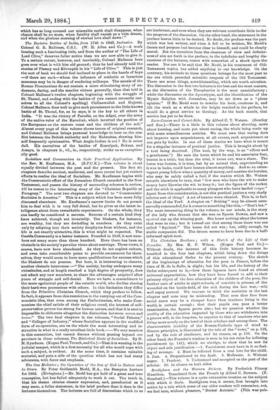Race-Course and Covert-Side. By Alfred C. T. Watson. (Bentley and
Son.)—There is a little in this volume about shooting, more about hunting, and more yet about racing, the whole being made up with some miscellaneous articles. We must own that racing does not improve upon acquaintance, at all events, such acquaintance as one gets by books. In one of these stories we have what is meant
for a singular instance of poetical justice. This is brought about by a tout being deceived. (The tout, by the way, is an "officer and a gentleman.") He sees the horse which he and his associates fear, beaten in a trial; but then the trial, it turns out, was a sham. The horse was beaten, it is true, but by an animal that, unpretending as it was in looks, could have beaten almost anything. And so an extra- vagant young fellow wins a quantity of money, and marries the heroine, who may be safely called a fool, if the maxim which Mr. Watson records elsewhere be true, that "few men who have the wit to make money have likewise the wit to keep it ; bat the figure of the rocket and the stick is applicable to many plungers who have landed coups." Apart from this consideration, is not this poetical justice a very shady inferior sort of thing ? A set of knaves were cheated. This is, in fact the ideal of the Turf. A chapter on " Betting " may be almost unre- servedly commended, for it comes to something like this,—" Don't bet." The most interesting thing in the volume, to our minds, is the story of the lady who dreamt that she was on Epsom Downs, and saw a squirrel ran up the winning-post. She knew nothing about the horses that were to run; but it turned out that among these there was one called "Squirrel." The horse did not win ; but, oddly enough, its stable companion did. The dream seems to have been due to a half- informed spirit-tout.


































 Previous page
Previous page